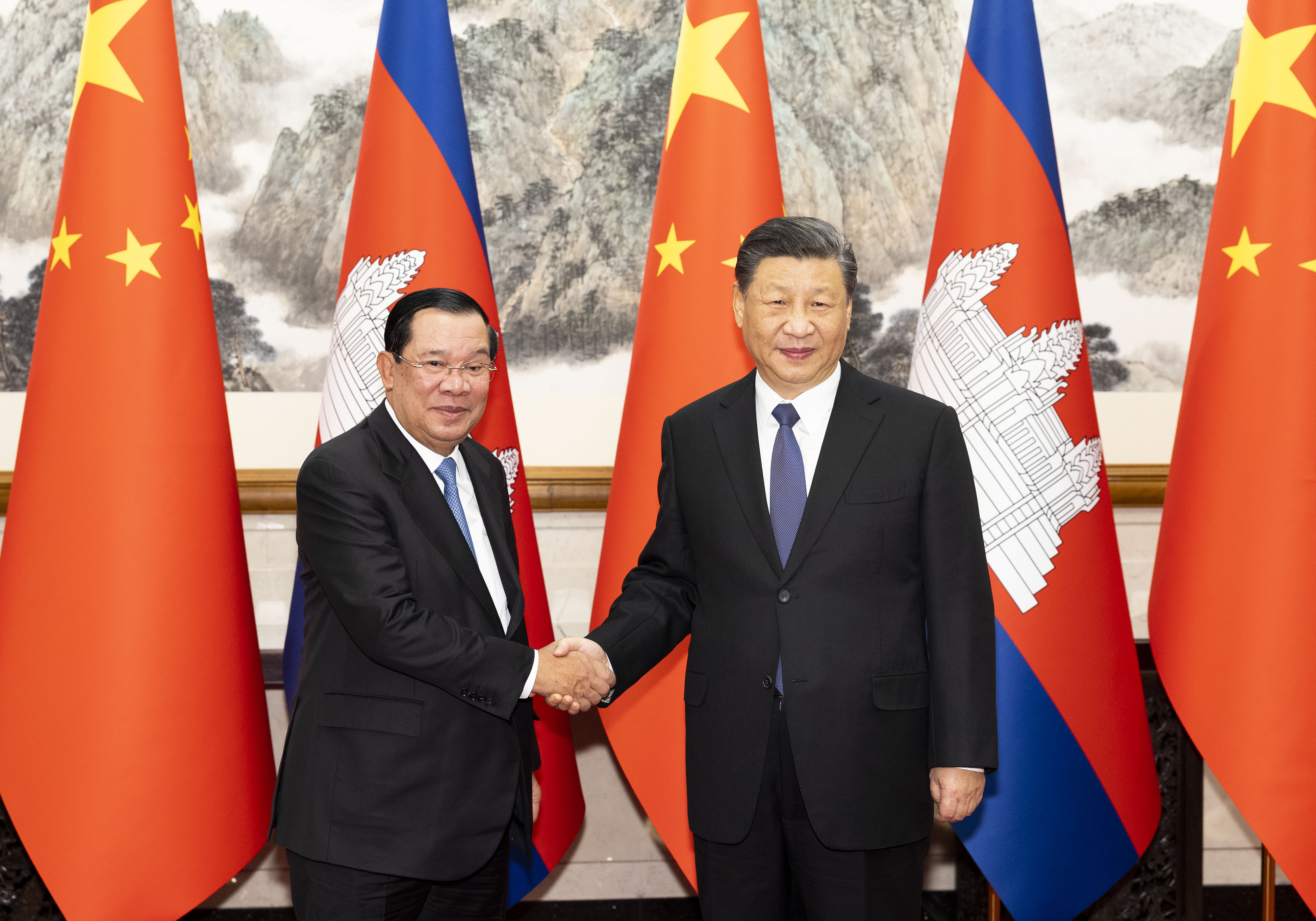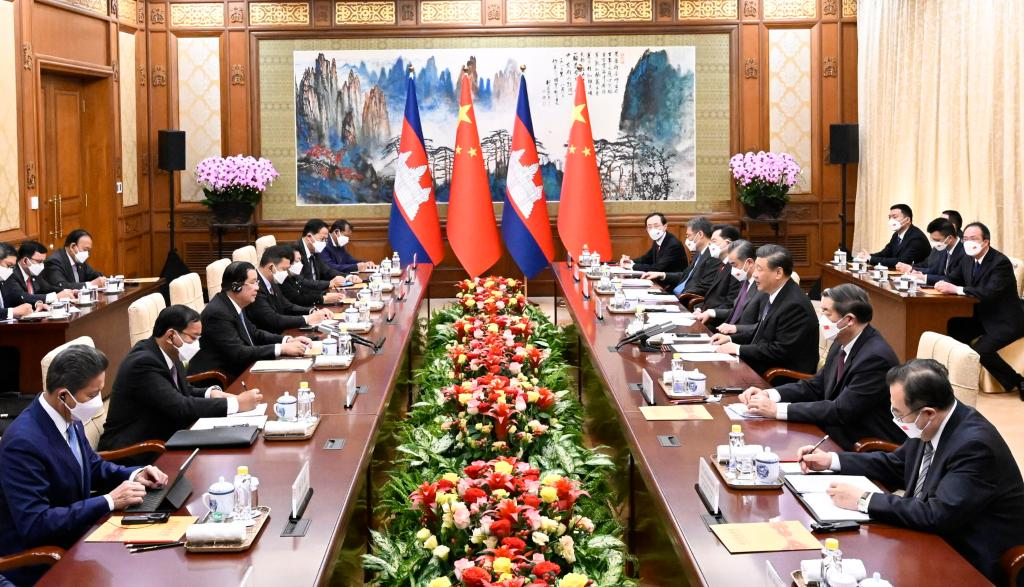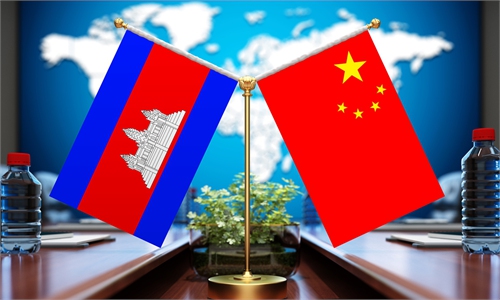China, Cambodia open new era for building community with a shared future
3-yr appointment shows trust; ironclad friendship to be passed on for generations

Chinese President Xi Jinping meets with Prime Minister of the Kingdom of Cambodia Hun Sen at the Diaoyutai State Guesthouse in Beijing, capital of China, Feb 10, 2023. Photo:Xinhua
Chinese President Xi Jinping met with visiting Prime Minister of Cambodia Hun Sen on Friday at the Diaoyutai State Guesthouse in Beijing, realizing an "appointment made three years ago" and underscoring the ironclad friendship between the two countries, which celebrate the 65th anniversary of the establishment of their diplomatic relations.
Eyeing the opening of a new era of building a China-Cambodia community with a shared future, the two leaders laid out a foundation for boosting bilateral cooperation to a new level, setting an example for the ASEAN community and drawing a sharp contrast to the US' engagement in the region, which is driven by hegemony, observers said.
During the meeting, Xi pointed out that three years ago, Hun Sen visited China as a token of support and stood firmly with the Chinese people in their fight against COVID-19.
At the beginning of 2020, when some countries arranged their diplomats and citizens to be evacuated from China and halted international flights during the country's nationwide fight against the COVID, Hun Sen's "opposite direction" visit sent a clear message of solidarity with the Chinese people.
Xi told Hun Sen on Friday, "It gives me great pleasure to work with you to realize our 'three-year appointment' and open a new era of building a China-Cambodia community with a shared future at the start of spring."
China supports Cambodia in taking a path that suits its reality and firmly rejects foreign forces' interference in Cambodia's internal affairs. China always views Cambodia as important in China's neighboring diplomacy, and pushes forward China-Cambodia cooperation in various fields at a strategic level, Xi said.
Xi pointed out that the two countries can build a cooperation framework in six major areas - politics, production capacity, agriculture, energy, security and people-to-people and cultural exchanges.
To build an industrial development corridor, China will encourage more Chinese firms to invest in Cambodia and facilitate the Sihanoukville special economic zone, the Chinese leader said. He also mentioned the building of a "fish and rice corridor," hydro and solar power investment in Cambodia, and joint combat against trans-border crimes. China will also prioritize resuming and increasing direct flights to the Southeast Asian country.
Hun Sen said he completely agrees with pushing forward the cooperation framework in six major areas, and expects to consolidate the Cambodia-China iron-clad friendship on the occasion of the 65th anniversary of the establishment of diplomatic relations between the two countries. Cambodia upholds the one-China principle, firmly supports China in safeguarding its sovereignty, security and development interests.
It also supports China's One Country, Two Systems and opposes any foreign interference in Hong Kong-, Xinjiang- and Xizang-related affairs, Hun Sen said.
Chinese observers believed the consensus reached by the two leaders clearly lays out the goal and structure of the cooperation, and this kind of ironclad friendship is expected to be passed on from generation to generation, regardless of changes in domestic politics.
Other ASEAN members including Laos, Thailand and Indonesia are committed to working with China in building a community with a shared future, which further shows that China's development and security initiatives resonate with their needs and governance, unlike Washington's plan to turn the region into a place for geopolitical wrestling between major powers, observers said.

Chinese President Xi Jinping meets with Prime Minister of the Kingdom of Cambodia Hun Sen at the Diaoyutai State Guesthouse in Beijing, capital of China, Feb 10, 2023. Photo:Xinhua
Broader cooperation
Against an increasingly uncertain international geopolitical backdrop, the close interactions between the leaders of China and Cambodia have deeper meaning beyond bilateral relations, as that will inject more certainty into regional development, "in response to US' touting of decoupling and attempts to form small cliques," Xu Liping, director of the Center for Southeast Asian Studies at the Chinese Academy of Social Sciences in Beijing, told the Global Times on Friday.
Xu noted that the cooperation framework highlighted the openness, high quality and standard, and comprehensiveness of cooperation between China and Cambodia in the six major domains.
The Regional Comprehensive Economic Partnership (RCEP) trade pact and the China-Cambodia Free Trade Agreement (CCFTA) entered into force on January 1, 2022.
The free trade agreement signed by China and Cambodia means zero tariffs on up to 90 percent of Cambodian imports from China and 98 percent the other way.
Cambodia is also the first country to sign an action plan to build a community of shared future with China. Its smooth implementation will set an example for other countries and be conducive to forging a new pattern of international relations, promoting global development in the post-COVID era, experts said.
Practical China-Cambodia cooperation has also benefited local people in Cambodia. For instance, over 170 companies across the world have settled in the Sihanoukville Special Economic Zone, creating nearly 30,000 jobs.
China-Cambodia bilateral trade crossed the $10 billion benchmark in 2021, two years earlier than expected.
According to the Economic and Commercial Office of the Chinese Embassy to Cambodia, the trade volume between China and Cambodia hit $14.5 billion from January to November 2022, a year-on-year increase of 19.1 percent.
Bilateral and multilateral cooperation between China and Cambodia under the Belt and Road Initiative and Lancang-Mekong Cooperation framework have already matured, and advancing the China-Cambodia community with a shared future will point out directions for future cooperation between those structures, Ge Hongliang, director of the China-ASEAN Maritime Security Research Center at Guangxi University for Nationalities, told the Global Times on Friday.
"Cambodia will hold a general election in 2023. But no matter what changes occur in its domestic politics, China-Cambodia cooperation will advance," Ge said.
During the meeting with Hun Sen, Xi said the acts of engaging in rivalry of systems or ideological confrontation, politicizing and weaponizing economic, trade, and technology exchanges, forcing the decoupling and breaking of the chain, curbing and suppressing the development of other countries, and requiring countries in the region to choose sides, are all power politics and hegemonic practices, and can never be popular.
Xu said the close relations between China and Cambodia are based on mutual respect and win-win cooperation, which is different from the US' Cold War and zero-sum game mentality.
The US has never ceased sowing discord between China and countries in Southeast Asia.
Just before Hun Sen's trip to Beijing, some US media played the old trick of hyping the so-called debt trap. The Cambodia Foreign Affairs Ministry criticized a story from the Voice of America as "unprofessional" and "misleading the public with political intent."
Regardless of whether the US presents the "Indo-Pacific Strategy" or "Indo-Pacific Economic Framework for Prosperity", the aim is to form a platform of strategic rivalry with China. "However, some ASEAN members share similar aspirations for development as China, and they are much more interested in development [rather than strategic rivalry]," Ge said.



